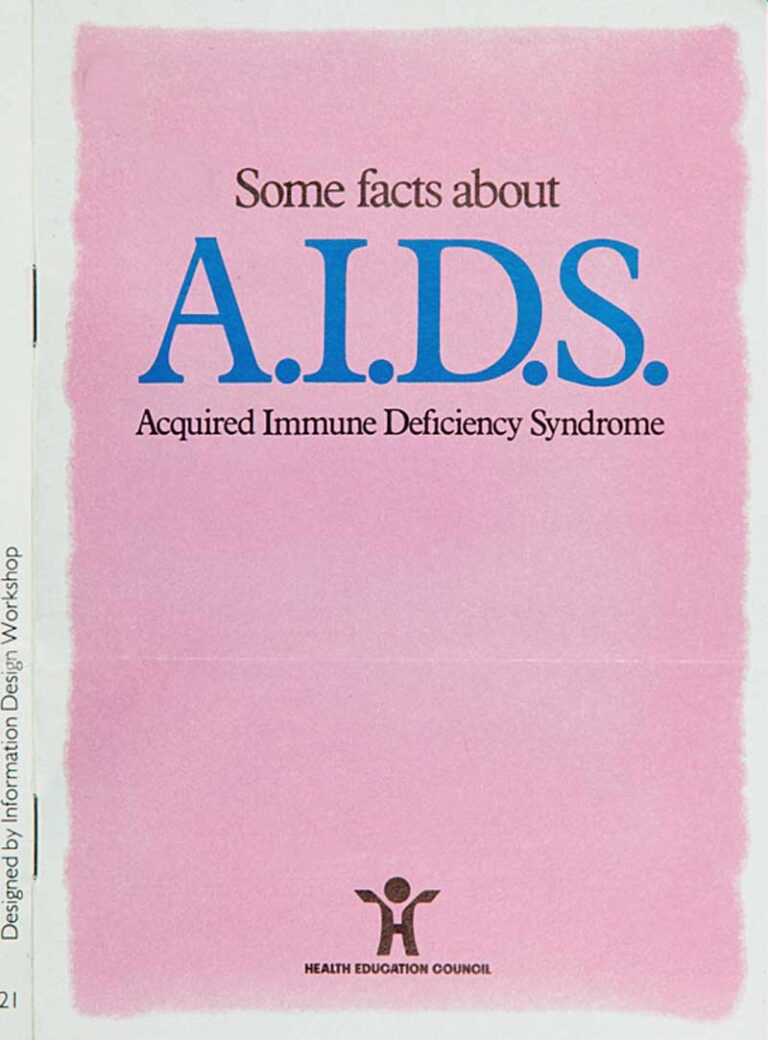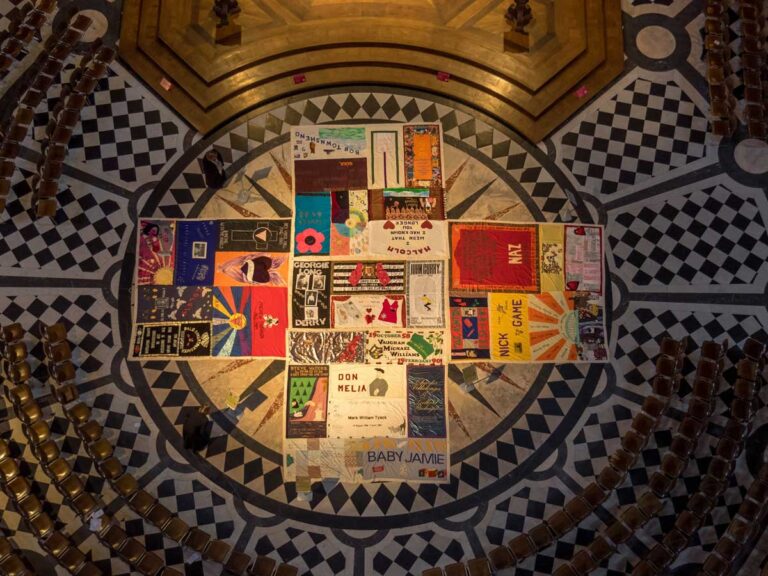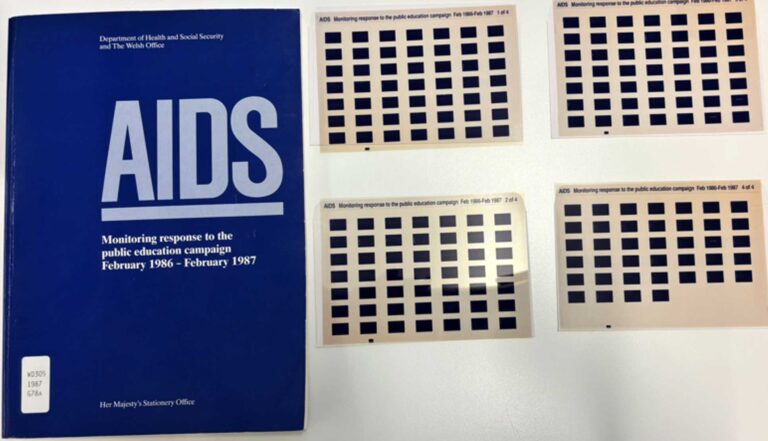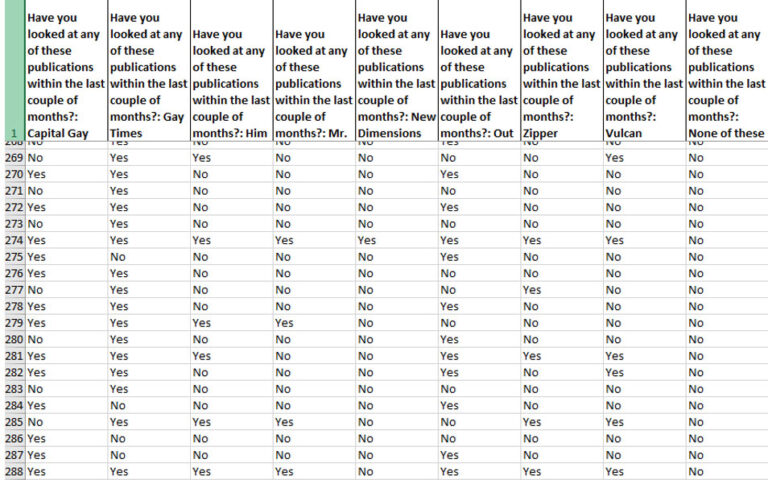The National Archives holds an extensive collection of material related to the HIV and AIDS epidemic of the 1980s. This includes cabinet papers and records documenting the government response, public health campaigns, and scientific research connected to the spread and effects of the virus (see our previous posts about The AIDS health campaign and HIV/AIDS and the LGBTQ+ community, for example).
However vast the collection, The National Archives’ records tell a limited story of the spread of HIV in the UK. As official documents of the state, they rarely convey anything of the lived experiences and emotions of people who lived (or live) with or in proximity to the virus. Such histories are often preserved elsewhere, by voluntary groups and in community archives. Though they offer different takes on historical facts, all these records are necessary and valuable.
To explore the wider landscape of collections and archives holding HIV and AIDS-related records and how they have been used for research or in creative practices, on 2 and 3 December – close to annual World AIDS Day – The National Archives will host two events: an online symposium and a digital humanities workshop.1

The symposium
The free online symposium HIV and AIDS Archives: collections, research, digital and creative responses will take place on Tuesday 3 December and will bring together researchers, historians, archivists, scholars, and creative practitioners who have worked with HIV and AIDS-related documents.
The early outcomes of the Documenting HIV and AIDS epidemic in United Kingdom survey (West Sussex Records Office) due to be published in 2025 will be presented alongside collections and cataloguing projects taking place at The National Archives, Wellcome Collection, Bishopsgate Institute and George House Trust. Living, crowdsourced and community archives such as The UK HIV and AIDS Design Archive or The UK AIDS Memorial Quilt will also be presented.

Scholars including Prof. Virginia Berridge, Dr. Hannah J. Elizabeth and Dr. George Severs will share their experience doing research in state and community archives, as well as working with oral history and grassroots activism.
Historian Wendy Rickard and playwright David Balcombe will talk about creative uses of HIV and AIDS archives, whereas digital researcher Bernard Ogden from The National Archives will show the challenges and opportunities of working with lesser-known digital resources.
You can access the full programme here and book your free place.
The workshop
The digital humanities workshop ‘HIV and AIDS Archives: Recovering, re-presenting and exploring open digital data’ will take place on Monday 2 December at The National Archives.
It will be open to a limited number of people (selected through an application process) and will be focused on the ‘1987 AIDS Advertising Evaluation Dataset’. This openly accessible dataset – produced at the time of the 1987 Public Health Campaign – aimed to capture a snapshot of the ‘public reaction over a period when Government, voluntary and statutory bodies and media have been united in their attempts to prevent the spread of HIV infection’.2

The survey, created before the formation of the Health Education Authority (HEA), was the first attempt to monitor the impact of the 1987 ‘Don’t Die of Ignorance’ public campaign. However important, it was soon replaced by an updated version designed by the HEA. The results of this first survey were deposited at the Data Archive (University of Essex) and subsequently transferred and made available openly for download on The National Archives’ catalogue Discovery (BN 97/1).3
Although they can now be used by anyone, the digital format they had been saved in required some manipulation to be made easily accessible.

Workshop attendees will learn how this raw data was transformed into a more easily accessible database by The National Archives’ digital researcher Bernard Ogden, and how it can unlock opportunities for digital storytelling. At the same time, the workshop will provide a space to think about how such datasets might reflect social sciences’ historical biases, which must be taken into consideration when using them for digital scholarship.
While it is explicitly a quantitative evaluation of the Health Campaign, the survey retains misconceptions around the spread and impact of HIV on people at the time of creation.
The workshop will be joined by Professor and historian of public health Virginia Berridge, and Professor Kaye Wellings, founder of the first National Survey of Sexual Attitudes and Lifestyles, who have worked extensively on the subject and who will help understanding the historical context of the survey creation, as well as the importance of such resources.
To apply to attend the workshop, please register your interest and send your application. Expressions of interest applications are open until 6pm, 20 November 2024.
If you have any questions regarding these events, please get in touch with research@nationalarchives.gov.uk
Footnotes
- As explained by Chris Olver (Project Archivist, Documenting HIV/AIDS epidemic in United Kingdom, West Sussex Records Office), ‘Current advice from UNAIDS, the United Nations special programme set up to co-ordinate action on the HIV/AIDS pandemic, states that the disease should be referred to as HIV or AIDS instead of HIV/AIDS. The reason behind this is avoid the confusion between HIV (a virus) and AIDS (a clinical syndrome)’. To learn more about inclusive cataloguing HIV and AIDS collections visit: Inclusive cataloguing in HIV/AIDS archive collections — Archives & Records Association ↩︎
- ‘Foreword’, AIDS. Monitoring response to the public education campaign February 1986 – February 1987. Report on fours surveys during the first year of advertising, Department of Health and Social Security and The Welsh Office, 1987. ↩︎
- With thanks to Chris Day for identifying and flagging up this resource. ↩︎